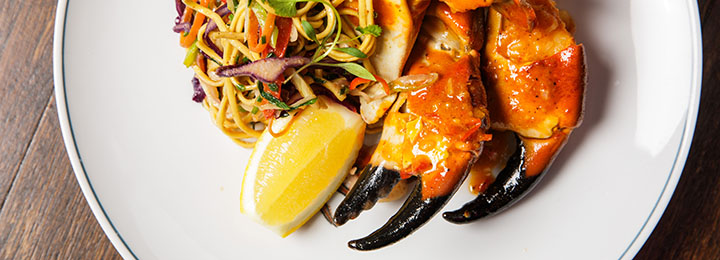Eating towards a greener Jersey ?
08.03.18 Back

Plastic straws, compostable cutlery, re-usable coffee cups, re-cycling, sustainable waste disposal, organic, carbon footprint and locally-sourced sustainable food. The list goes on but these are the words restaurants, cafés and hospitality businesses are hearing more frequently in communications with the press, environmental groups and customers.
The world we live in with its seemingly insatiable demand for tasty, quickly-served, cheap and easy-to-eat food has driven practices which are damaging our environment. It’s understandable that our customers are concerned with the impact our industry is having on our Island.
At JPRestaurants we are concerned too. And not just because it makes good business sense. We are a fourth generation family-owned business and a team who live in Jersey and love the Island’s natural environment. We want our children and grandchildren to enjoy the island as we do now. We see damage being done to our countryside and seas and want to help reduce the impact we, our suppliers and our customers have on our environment.
We welcome the increased focus on our practices and others involved in the supply of food in the Island but we also recognise it’s a complex area and not one where decisions can be made on a whim where environmental initiatives are packaged into sound-bite advertising adding to the “green-washing” which sometimes occurs in our industry.
We start from the standpoint that no business , including us, should call itself “green” as there will always be other businesses that are greener, or that others perceive are more green, than us.
As a business we continually review our environmental and other practices dependent on our own views and importantly customer and wider community feedback. We are mindful of our environmental footprint and regularly look at the impact we make on our natural surroundings, balancing against customer demand and the competitive environment. In the past we generally haven’t shouted about our green credentials because we find it’s easy to be shot down. Those that do shout about it often don’t live up to the hype in other areas of their business or fail to look at the whole supply chain, part of which is invisible to customers.
Using recyclable cups or plastic bottles in Jersey may sound environmentally friendly but if there is no widely available way to re-cycle them, which there currently isn’t, then they don’t really achieve their objective. Also biodegradable and compostable plastics rely on landfill and specialist facilities, which we don’t have in Jersey, to achieve the right balance. And even biodegradable plant-based cutlery will release green house gases when incinerated (the main form of waste disposal in Jersey) and require cultivation of wild land which can lead to deforestation or land diverted away from food production. A final example is the labeling of food as “local” or “regional” which is often used to imply it is “good” or better than imported food. But local food farmed intensively with widespread use of chemicals can be worse for the environment than importing food produced by farmers with more sustainable and environmentally friendly practices.
We feel it’s time to provide some transparency on our environmental initiatives which are driven by what we believe and also what customers have asked us to do. And you our customers are key in all our initiatives because if you don’t buy into them, we can’t have the impact we all want to see. So what have we been up to over the last few years?
• We introduced the first re-useable KeepCups to our cafés seven years ago. We sell them with a free coffee at below cost price and offer a discount to customers using them. This initiative has continued since 2011 but we had very little take up from customers. The current focus on plastics following the Blue Planet series has resulted in greater customer interest and from March 12th we will increase the discount to customers to 25p in addition to further points worth 10% offered to Loyalty Card holders.
• We sort and separate recyclable waste and voluntarily pay a local charity to collect and process cardboard packaging and used cooking oil from our outlets because some Parishes don’t carry a selective recycling pick up.
• Our kitchens in all our restaurants have electric induction ranges reducing our use of carbon fuels. A significant portion of our local energy is produced without carbon fuels and energy usage now stops as soon as the pan is taken off the range. Most commercial kitchens using gas leave them burning for the whole service which wastes energy and contributes to green house gases. Our café kitchen still has gas but will be replaced with induction at the end of its useful life.
• We have stopped using plastic straws in all our outlets and now supply paper and plant starch compostable straws.
• We have introduced biodegradable cutlery in Café Ubé and stopped using plastic disposable cutlery. Customers now have to opt in for cutlery. We re-use bags handed back to us by customers. We are looking into the harder issue of packaging and hope to offer greener alternatives in the future.
• We’ve introduced a handy re-useable spoon/fork at Café Ubé. The Spork Originals will soon be available for cost price to Loyalty Card holders. Designed by Scandinavian designer Joachim Nordwall, the Spork is perfect for eating on the go or at your desk.
• All unsold food from our four Café Ubé outlets is taken to other outlets and offered free to staff.
• We are planning to replace mineral water provided to our head office team with a water fountain. And we’ve bought reusable branded water bottles for all restaurant and café staff.
• We work with suppliers to source local food where it tastes good and importantly we are starting to ask farmers, oil and wine producers about their environmental and welfare practices. Just because food is local doesn’t make it greener. We take this into account when placing orders. This is in addition to the work we have done for years visiting and monitoring suppliers with spot checks to ensure the quality and food safety aspects of their operations.
• We try to work with seasonal food as much as possible because it tastes better and has less of an environmental impact. This year we’ve selected a single farm to source our Jersey Royals and won’t be putting them on our menu until the outdoor crop is available.
• We are open and transparent with customers about our food sourcing and preparation. We are only able to do this and provide correct information by having a focus on our food sourcing, menu planning and training. This enables us to let customers know where our food comes from and what is in it but also provide them with an allergen menu showing 14 key allergens across all our menus. We are not afraid for instance to let customers know that we use frozen products, such as chips, if we feel there are superior to fresh ones. We also don’t hide the fact that despite being surrounded by the sea, most of our fish (as with other restaurants in the Island) is imported. We have tried (and failed) to work with fishermen and government to increase the amount of local fish available on our menus. We have however recently been to Guernsey to open a supply of wet fish. It’s the same waters so we think we can call it local. Guernsey unlike Jersey has maintained a larger fishing fleet and has good availability of great local fish like brill and turbot. Thankfully our shellfish is predominantly sourced from our local Jersey fishermen but we still have times when we can’t easily source local crab yet we as an island export over 60% of the crab caught locally.
We believe that transparency is as important as regulation to drive environmental practices because armed with the right knowledge we believe customers in Jersey will vote with their “environmental feet and tummies”.
We know we can do more and so we will continue to look at ways of reducing our impact on our environment. We welcome ideas and questions from customers. Please contact us via this link.




